 The UK’s hospitality industry and hospitality education are both suffering from multiple political, economic and funding impacts that are having an adverse effect on recruitment. It’s not just the continuing problem of staff recruitment – there is also the additional problem of recruiting students to hospitality courses and training.
The UK’s hospitality industry and hospitality education are both suffering from multiple political, economic and funding impacts that are having an adverse effect on recruitment. It’s not just the continuing problem of staff recruitment – there is also the additional problem of recruiting students to hospitality courses and training.
The degree of uncertainty over the future and the “Brexit” factor is already a major factor in staff recruitment. There are added difficulties and potential additional costs for employers in obtaining visas for international staff – including those from the European Union – which does nothing to alleviate employers concerns. The general sense of creating a “hostile environment” for immigration is hardly conducive in encouraging potential international employees. This when seen against the lowest UK unemployment levels for decades, begs the question where are the staff going to come from? Unfortunately, the answer is not from an increasing number of hospitality students.
The demand for professional staff will continue to increase, whilst the supply, through the uncertainties of Brexit and a reduction in the number of students entering hospitality related courses, will diminish.
For hospitality education and the industry, there are a number of indicators that suggest a significant cause for concern. The first is in the recruitment of hospitality related apprentices including chefs, and the second is in the number of hospitality focussed higher education courses now being offered. The available evidence indicates there has been a reduction in the number of apprentices as well as a reduction in the number and scale of hospitality courses. It is recognised that these are only two indicators and that the story is incomplete. Evidence from the further education (vocational) sector is difficult to establish other than through anecdotal evidence, which suggests a similar picture is emerging for those colleges offering hospitality courses.
As one example, the recently published Liverpool City Region, Skills for Growth Action Plan – Visitor Economy 2018 – 2020, highlighted this issue and summarised it well; “Most employers reported problems with recruitment, and a number of colleges were finding increasing difficulty enrolling students in courses relevant to the Visitor Economy”.
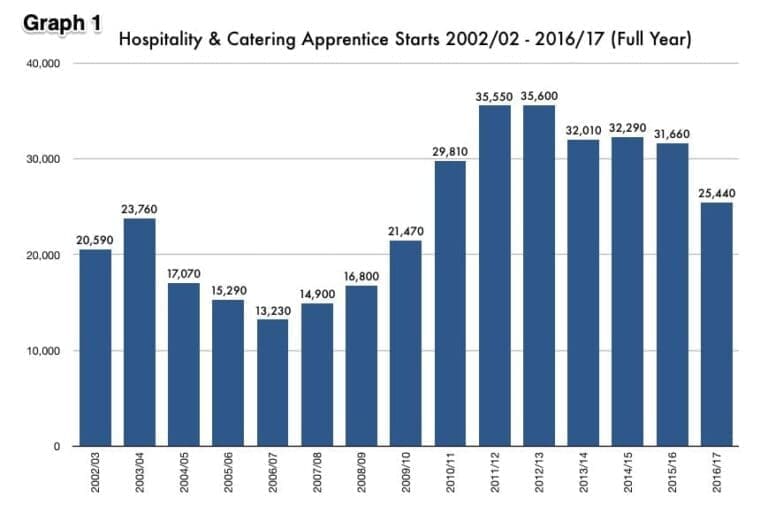 The first hospitality education and training quantitative indicator is the marked reduction in the number of apprentices at all levels. Over the past five years there has been a net decline in the number of hospitality related apprentices from 35,500 in 2011/12 to 25,500 in 2016/17. (Graph 1) What has also changed is the age profile of apprentices, with the largest age group now aged 25+. (Graph 2) This may be a reflection of the more advanced apprenticeships now on offer but for the ‘traditional apprenticeships’ offered to school leavers in the under 19 age group, the number has now dwindled to less than a 1000.
The first hospitality education and training quantitative indicator is the marked reduction in the number of apprentices at all levels. Over the past five years there has been a net decline in the number of hospitality related apprentices from 35,500 in 2011/12 to 25,500 in 2016/17. (Graph 1) What has also changed is the age profile of apprentices, with the largest age group now aged 25+. (Graph 2) This may be a reflection of the more advanced apprenticeships now on offer but for the ‘traditional apprenticeships’ offered to school leavers in the under 19 age group, the number has now dwindled to less than a 1000.
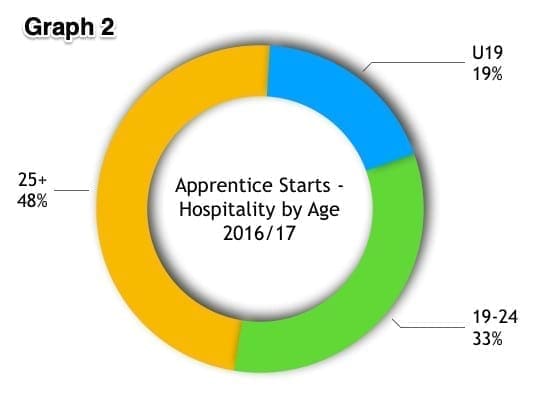 Anecdotal evidence suggests that some large companies paying the apprentice levy are recouping that payment through putting current employees and more senior staff on intermediate and advanced level apprenticeships. This could be seen as a form of professional development, but is rather counter to the traditional view of what an apprentice is. Whilst they may be classified as “apprentices”, they are not new entrants to the industry. It may help with the retention, but not the recruitment of new staff.
Anecdotal evidence suggests that some large companies paying the apprentice levy are recouping that payment through putting current employees and more senior staff on intermediate and advanced level apprenticeships. This could be seen as a form of professional development, but is rather counter to the traditional view of what an apprentice is. Whilst they may be classified as “apprentices”, they are not new entrants to the industry. It may help with the retention, but not the recruitment of new staff.
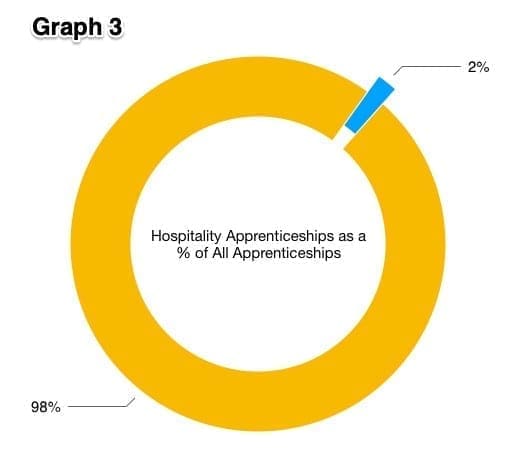 What is also surprising, for an industry that employs 1 in 13 people in the UK, hospitality apprenticeships only account for less than 2% of the total number of apprentices, (Graph 3) with accounting apprentices now outnumbering hospitality apprentices! (Graph 4)
What is also surprising, for an industry that employs 1 in 13 people in the UK, hospitality apprenticeships only account for less than 2% of the total number of apprentices, (Graph 3) with accounting apprentices now outnumbering hospitality apprentices! (Graph 4)
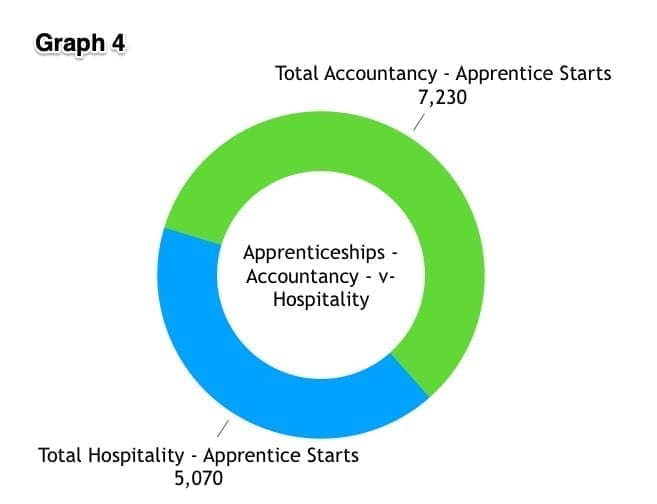 The second quantitative indicator is in the reduction in the number of hospitality related courses being offered through universities and colleges. In 2014, there were 142 hospitality related courses being offered in 64 institutions. That figure has now reduced to 127 courses although the number of institutions remains at 64. The number of institutions, however, masks some significant changes in the types of institutions offering hospitality courses.
The second quantitative indicator is in the reduction in the number of hospitality related courses being offered through universities and colleges. In 2014, there were 142 hospitality related courses being offered in 64 institutions. That figure has now reduced to 127 courses although the number of institutions remains at 64. The number of institutions, however, masks some significant changes in the types of institutions offering hospitality courses.
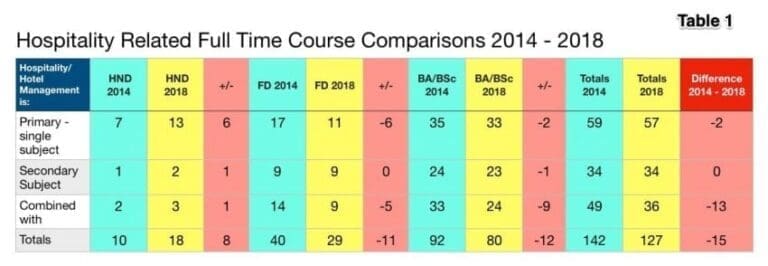 Some universities, for example Glasgow Caledonian University, are withdrawing from hospitality, whilst a number of London based private colleges (12) are now offering Higher National Diploma programmes. As Table 1 shows, there has been a reduction in the number of courses where hospitality is offered as the primary or single subject, as well as a reduction in courses where hospitality is offered in combination with other subjects. Both suggest that the role of hospitality as a major subject area within higher education institutions is on the decline.
Some universities, for example Glasgow Caledonian University, are withdrawing from hospitality, whilst a number of London based private colleges (12) are now offering Higher National Diploma programmes. As Table 1 shows, there has been a reduction in the number of courses where hospitality is offered as the primary or single subject, as well as a reduction in courses where hospitality is offered in combination with other subjects. Both suggest that the role of hospitality as a major subject area within higher education institutions is on the decline.
This indicator is supported by the indications that two universities, Bournemouth and Oxford Brookes, have signalled that they are considering, or intend to close their hospitality provision within the next three years.
This is a snapshot of hospitality education in the UK using the two indicators of apprenticeships and higher education courses. In both cases, the data suggests that hospitality as a course and career choice is on the decline. It has not been possible to access relevant further education data sets, but the anecdotal evidence indicates a similar pattern emerging. The scale and rate of the decline is of concern and mirrors reported similar international trends.
As an industry, hospitality is facing a ‘perfect storm’ of the recruitment and staffing impacts of Brexit, at the same time that the number of students entering hospitality education and training is on the decline.































